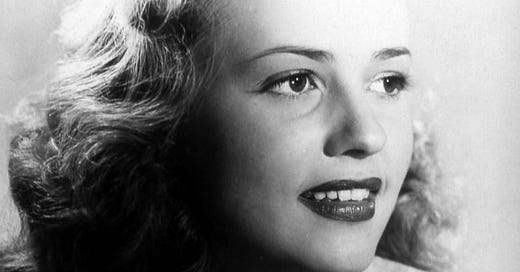Monday, April 1st (our show in the Big Roxie…) provides a fascinating look at “three phases” of Jeanne Moreau, whose legendary presence in film is now fait accompli. After we look at the film that made her notoriously alluring (THE LOVERS), and see her usurp the spotlight from Orson Welles in THE IMMORTAL STORY, we bring you a genuine rarity: Moreau’s first film, DERNIER AMOUR (aka LAST LOVE), directed by melodrama specialist Jean Stelli. In it we see—sometimes distantly—the seeds of what was to come.
To give us more context and detail about the very young Jeanne Moreau and the film itself, we are (as always) fortunate to have Phoebe Green on hand—and I trust that her writing will help convince you to join us for this ultra-rare screening that reveals where Moreau began…
WHEN World War II ended, France entered its Trente Glorieuses, a thirty-year period of economic recovery and soaring private consumption, further cushioned by extensive social benefits.
The Liberation also brought female suffrage—at least partly in recognition of women’s contribution to the Resistance—and, to counter it, a retrograde impulse to send women back to the kitchen or the salon, depending on their class. Meanwhile, a jubilant new counterculture was bubbling in Saint Germain des Prés.
Very much of this moment, DERNIER AMOUR, a plush “woman’s picture,” sets Annabella, the beautiful but older wife of Georges Marchal, against Jeanne Moreau, in her first screen role, as a petulant 20-year-old bohemian, a distant cousin of the husband.
SHE is frank, unsmiling, unadorned. She plays both the timelessly sulky adolescent (“I don’t like women,” she declares calmly) and Left Bank girl of the moment, loving “wildflowers, Siamese cats, tormented souls, Piguet perfume, Existentialism, and Dizzy Gillespie records.” Her heartfelt earnestness permeates every line. (Fresh from the Comédie Française and completely unfamiliar with film technique, she would play full out even when she was offscreen, to the amusement of the crew.) She is first love, scornful of the guilt and compromises of last love.
While adapted from an 1889 novel set among the nobility, the film involves the comfortable bourgeoisie: a family textile business, a medical practice, stay-at-home wives and their servants. Even the bohemian upstart who threatens their peace is, in fact, an heiress. Money and how it is acquired have no role in this film. We see nothing of the textile factory or the doctor’s office; we do see the well-equipped kitchen with which the lady of the house, despite her staff, has a pluperfect familiarity. This women’s world is all adorable hats and skiing vacations.
Such a film seems a strange assignment for its screenwriter, Françoise Giroud, who had been a working woman since her early teens, was currently editor-in-chief of the premier women’s weekly Elle, and would, in the 1970s, hold the post of French secretary of state for women’s rights. The film does, however, bristle with sharp little observations: when the protagonist visits a couple of working women, her graciousness is painfully out of place; her wisecracking sister (Suzanne Flon, adorable) punishes her straying husband by leaving him with children and housework on his hands for a few days: “that’ll show him!” “Unless he hires a maid,” Georges Marchal rejoins. “Why would he, when I do it all for free?”
Romantic love itself is presented in a dubious light. Both women in the triangle count on love exclusively to give meaning to their lives, and we see how this expectation tortures them and those around them. (This is not limited to women alone: Annabella’s first husband, confronting her lover in 1939, is exasperated by the young man’s blindness to the threat of world war.)
As DERNIER AMOUR ends on a glowing clinch, are we meant to wonder—just how happy an ending is this?
For more information and tickets to our “3 With Moreau” presentation on Monday, April 1st, go here.






